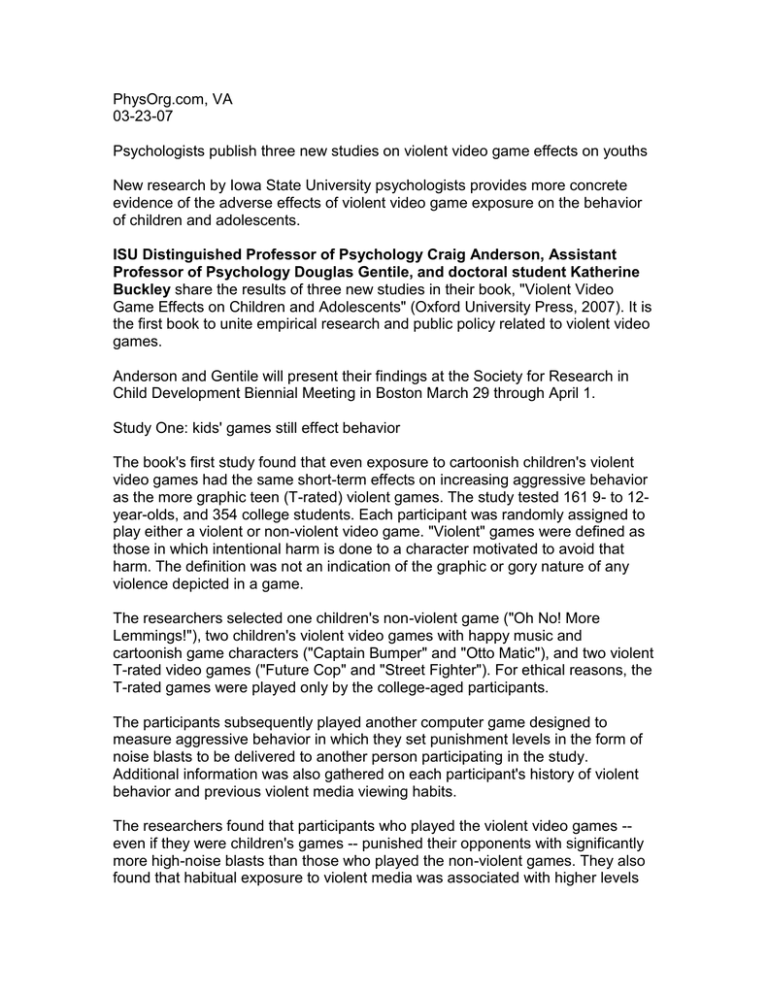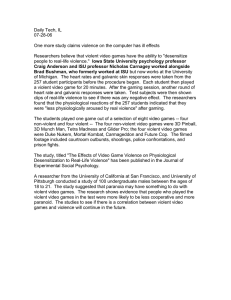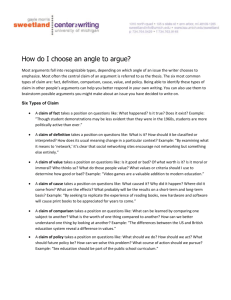PhysOrg.com, VA 03-23-07
advertisement

PhysOrg.com, VA 03-23-07 Psychologists publish three new studies on violent video game effects on youths New research by Iowa State University psychologists provides more concrete evidence of the adverse effects of violent video game exposure on the behavior of children and adolescents. ISU Distinguished Professor of Psychology Craig Anderson, Assistant Professor of Psychology Douglas Gentile, and doctoral student Katherine Buckley share the results of three new studies in their book, "Violent Video Game Effects on Children and Adolescents" (Oxford University Press, 2007). It is the first book to unite empirical research and public policy related to violent video games. Anderson and Gentile will present their findings at the Society for Research in Child Development Biennial Meeting in Boston March 29 through April 1. Study One: kids' games still effect behavior The book's first study found that even exposure to cartoonish children's violent video games had the same short-term effects on increasing aggressive behavior as the more graphic teen (T-rated) violent games. The study tested 161 9- to 12year-olds, and 354 college students. Each participant was randomly assigned to play either a violent or non-violent video game. "Violent" games were defined as those in which intentional harm is done to a character motivated to avoid that harm. The definition was not an indication of the graphic or gory nature of any violence depicted in a game. The researchers selected one children's non-violent game ("Oh No! More Lemmings!"), two children's violent video games with happy music and cartoonish game characters ("Captain Bumper" and "Otto Matic"), and two violent T-rated video games ("Future Cop" and "Street Fighter"). For ethical reasons, the T-rated games were played only by the college-aged participants. The participants subsequently played another computer game designed to measure aggressive behavior in which they set punishment levels in the form of noise blasts to be delivered to another person participating in the study. Additional information was also gathered on each participant's history of violent behavior and previous violent media viewing habits. The researchers found that participants who played the violent video games -even if they were children's games -- punished their opponents with significantly more high-noise blasts than those who played the non-violent games. They also found that habitual exposure to violent media was associated with higher levels of recent violent behavior -- with the newer interactive form of media violence found in video games more strongly related to violent behavior than exposure to non-interactive media violence found in television and movies. "Even the children's violent video games -- which are more cartoonish and often show no blood -- had the same size effect on children and college students as the much more graphic games have on college students," said Gentile. "What seems to matter is whether the players are practicing intentional harm to another character in the game. That's what increases immediate aggression -- more than how graphic or gory the game is." Study Two: the violent video game effect Another study detailed in the book surveyed 189 high school students. The authors found that respondents who had more exposure to violent video games held more pro-violent attitudes, had more hostile personalities, were less forgiving, believed violence to be more typical, and behaved more aggressively in their everyday lives. The survey measured students' violent TV, movie and video game exposure; attitudes toward violence; personality trait hostility; personality trait forgiveness; beliefs about the normality of violence; and the frequency of various verbally and physically aggressive behaviors. Sponsored Links (Ads by Google) Video Game Ringtones Send this ringtone to your phone right now! RingRingMobile.com End Video Game Addiction Helps parents manage the time kids play video and computer games www.usebob.com Video Game Rentals Over 4,000 Titles. No Late Fees. Start for $8.95 or Try for Free! www.GameFly.com The researchers were surprised that the relation to violent video games was so strong. "We were surprised to find that exposure to violent video games was a better predictor of the students' own violent behavior than their gender or their beliefs about violence," said Anderson. "Although gender aggressive personality and beliefs about violence all predict aggressive and violent behavior, violent video game play still made an additional difference. "We were also somewhat surprised that there was no apparent difference in the video game violence effect between boys and girls or adolescents with already aggressive attitudes," he said. The study found that one variable -- trait forgiveness -- appeared to make that person less affected by exposure to violent video games in terms of subsequent violent behavior, but this protective effect did not occur for less extreme forms of physical aggression. Study Three: violent video games and school A third new study in the book assessed 430 third-, fourth- and fifth-graders, their peers, and their teachers twice during a five-month period in the school year. It found that children who played more violent video games early in the school year changed to see the world in a more aggressive way, and became more verbally and physically aggressive later in the school year -- even after controlling for how aggressive they were at the beginning of the study. Higher aggression and lower pro-social behavior were in turn related to those children being more rejected by their peers. "I was startled to find those changes in such a short amount of time," said Gentile. "Children's aggression in school did increase with greater exposure to violent video games, and this effect was big enough to be noticed by their teachers and peers within five months." The study additionally found an apparent lack of "immunity" to the effects of media violence exposure. TV and video game screen time was also found to be a significant negative predictor of grades. The book's final chapter offers "Helpful Advice for Parents and Other Caregivers on Choosing and Using Video Games." The authors say that providing clear, science-based information to parents and caregivers about the harmful effects of exposure to violent video games is the first step in helping educate the people who are best able to use the information. The advice includes links to Web sites about entertainment media and parenting issues, including Anderson's and Gentile's Web pages at http://www.psychology.iastate.edu/faculty/caa/ and http://www.psychology.iastate.edu/faculty/dgentile . Source: Iowa State University



